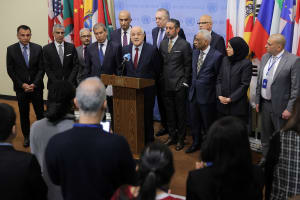Democrat Mideast analyst lauds Abraham Accords, dismisses Trump’s role
“President Trump taking credit for these deals this week is like the rooster taking credit for the dawn,” says former National Security Council staffer

DENVER — A backlash is building against the significance of the Abraham Accords.
A growing number of mainstream media journalists and left-leaning Middle East analysts are claiming either that Israel’s peace deals with the United Arab Emirates — the first Arab-Israeli treaties in a quarter of a century — are not really a big deal, or that they will actually lead to war, or that they were nice but inevitable and that the White House deserves no credit for brokering them.
NBC News’ Andrea Mitchell says Tuesday’s treaty signing was a bunch of “pomp and circumstance....but it is not Middle East peace.”
An Associated Press analysis says “it’s debatable whether agreements like these, among already friendly countries, do much to advance regional peace.”
The Al Jazeera satellite news network says “those celebrating the ‘historical peace agreement’ may soon discover it is nothing more than a drive towards another regional conflict or worse, war.”
Now, a former National Security Council staffer from the Clinton administration tells ALL ISRAEL NEWS that the Abraham Accords certainly “represent a step in the positive direction” but that “President Trump taking credit for these deals this week is like the rooster taking credit for the dawn.”
Brian Katulis is a senior fellow at American Progress, where his work focuses on U.S. national security strategy and counterterrorism policy. He worked at the National Security Council and the U.S. Departments of State and Defense during President Bill Clinton’s administration.
Here is our interview, conducted by email.
ROSENBERG: Brian, you’re a Democrat, a leading national security analyst on the center-left with significant experience in the Middle East, and you served in the Clinton administration. How do you see the decisions by the United Arab Emirates and Bahrain to make peace with Israel?
KATULIS: The agreements signed between Israel, Bahrain and the United Arab Emirates to establish full normalization of relations represent a step in the positive direction, but many questions remain unanswered about what is next. The main question that remains: Can this realignment improve the lives of Palestinians and Israelis on the ground and increase security and prosperity for all of the parties? If the answer is no, then the potential of this step would be squandered.
Today's Middle East is overwhelmed by too many wars and conflicts, and a diplomatic move like this one that seeks to improve relations between countries of the region is a good move. To be clear, these deals aren't technically peace agreements — Bahrain and the United Arab Emirates did not exist as independent nation-states until 1971 and did not participate in the 1973 war. What the agreements essentially do is bring out of the shadows relationships that have existed for decades mostly on the security front, and they open the door to wider arenas of open cooperation between Israel and these two countries in ways that could be positive, but only if the centrality of the Palestinian issue is prioritized.
A lasting and comprehensive peace in the Middle East will only be achieved through inclusive diplomacy — one that takes into account the issues central to the Israeli-Palestinian conflict. It also requires a steady and consistent approach by the United States that puts diplomacy first on a broad set of regional security challenges including tensions with Iran and peace efforts in Libya, Yemen and Syria — and on this broader front the Trump administration's actions have been erratic, unhelpful and too often absent from the scene. A steadier hand is required than what we've seen from President Trump and his team.
ROSENBERG: Why have these deals come together now? What has changed so dramatically in the Middle East that Gulf countries are ready to normalize relations with Israel at this particular moment?
KATULIS: A few factors shaped the timing of these agreements.
First, some of Israel's leaders were threatening to annex or extend its law to parts of the West Bank in ways that would render a two-state solution completely dead, as opposed to just barely being on life support as it is now. That unilateral action would have potentially destabilized the Middle East, particularly key U.S. partners like Jordan. This motivated the UAE to state more clearly its position against annexation earlier this summer. The Emirati opposition to annexation generated a debate within Israel and a discussion that led to the first deal announced in August. If Israel tries to move back to the path of unilateral moves like annexation, the UAE and Bahrain could put the brakes on the process of normalization of relations.
Second, the UAE has made clear for years that it wants F-35s from the United States, and the Trump administration has a track record for giving in easily with countries like the UAE and Saudi Arabia — it has offered them a blank check for years. There is a genuine worry that if Trump isn't re-elected in November, his successor would not be as much of a pushover as Trump is. Congress will likely pose a complicating factor on this part of the arrangement, and Israel is also debating the wisdom of this component of the broader understanding that drove the timing of this deal. But with the clock ticking on America's elections, it seems that the UAE saw a window to try to get a commitment from Trump on F-35s.
Bahrain has been prepared for years to make public gestures towards Israel and has taken a lead on things like religious dialogue and an economic conference in 2019, a conference that was overshadowed by tensions with Iran that summer. It was poised to make similar moves, but it seems that the UAE moved more quickly.
The looming shadow of Iran — and the shared threat perception that Israel, the UAE and Bahrain have about Iran — is a factor that drove these countries to forge a more open relationship between these countries. The tectonic plates in the Middle East have been shifting for years — and the 2003 Iraq war and its fallout contributed to the rise of Iran's influence. Also, countries in the region see in America a waning appetite for deep and thoughtful engagement in the Middle East. Instead, they see America as a country increasingly consumed with its own divisions and incapable for addressing basic fundamentals like responding to the pandemic and economic crisis. So they are cutting deals with each other. The region is realigning itself, with countries testing the limits of their power and seeking out new arrangements.
President Trump taking credit for these deals this week is like the rooster taking credit for the dawn. The headlines of Trump's Middle East approach remain "maximum pressure" on Iran, a similar effort to put pressure on and isolate Palestinians, and a strong desire to withdraw from the Middle East overall — and that's not a formula for long-term success or stability.
What's needed is more diplomatic engagement with a wider range of actors and more contact between the peoples of the region who remain too isolated from one another. These agreements open up the possibilities for new conversations — but the conversation needs to include Palestinians.
ROSENBERG: How do you view the fact that the move of the American Embassy to Jerusalem and the controversial Trump “Deal of the Century” Plan did not dissuade Crown Prince MBZ and King Hamad from normalizing?
KATULIS: These normalization agreements aren't the product of some uncanny diplomatic wizardry by the Trump administration. They are the result of shifting interests, priorities and alliances that have been in motion for many years. It is unlikely that these deals will fundamentally shift the overall instability in the Middle East. They offer that potential — if a steady hand is clear-eyed about the openings these agreements might present.
The Jerusalem embassy move was strongly condemned across the Middle East and remains unpopular — even though the move has strong bipartisan support in Congress. This move was made without a clear eye to the next steps in a broader game plan.
The Trump plan has not produced any progress on the key front — the Palestinian front, and it did not move other key countries in the region including Saudi Arabia, Oman, Kuwait, Qatar and Morocco to join.
One fundamental reality remains — for a peace agreement to be sustainable, it must be the product of dialogue and diplomacy.
ROSENBERG: If it comes to power, how might a Biden-Harris administration build upon this regional progress?
KATULIS: The first thing a Biden-Harris administration will have to do in the Middle East is a damage assessment of the past decade. The turmoil of long-standing conflicts that have killed hundreds of thousands and displaced millions in Syria, Yemen and Libya, and the heightened tensions with Iran brought America and the region to the brink of war several times over the past few years. These deadly conflicts are straining the international system and risk wider conflagrations, and they need to be resolved.
The second thing a new U.S. administration should do is recognize that the Middle East remains an arena for competition with other global powers like China and Russia. Simplistic notions that the United States could simply just retrench at home or pivot or rebalance to other regions of the world ignore the reality that the region remains deeply connected to global trends and without a steadier focus on diplomacy, the ongoing tensions and conflicts could present even greater problems in the years to come.
Third, a new U.S. administration should do more to listen to the people of the region who are still clamoring for change and want greater respect for basic rights and dignity and key freedoms, like freedoms for religion and speech. Most countries in the Middle East today still face a crushing set of demographic, economic and social challenges exacerbated by conflict and coronavirus — and the U.S. should seek to help the people of the region help themselves in addressing these challenges.
Finally, a new U.S. administration should look for the opportunities to work with regional partners to produce serious progress on the diplomatic front. A key component of the formula is building relationships of trust and confidence. A new U.S. administration would be wise to reach out to as many voices in the region and look for avenues for de-escalating tensions with Iran, opening new doors of dialogue between Palestinians and Israelis and their neighbors, and making true conflict resolution and peace a higher priority in U.S. policy. This can't be done through threats, arms sales and pressure.
One lesson of the past 40 years of efforts to achieve Middle East peace is that partial and incomplete deals are not likely to improve the situation. Another lesson is that regular people of the region need to see the fruits of peace for the agreements to have a lasting and transformative impact.
The agreements Israel signed with the UAE and Bahrain open the door to new conversations — and that's a good thing — but the question is whether leaders will rise to the moment and use these discussions to their fullest potential.

Joel C. Rosenberg is the editor-in-chief of ALL ISRAEL NEWS and ALL ARAB NEWS and the President and CEO of Near East Media. A New York Times best-selling author, Middle East analyst, and Evangelical leader, he lives in Jerusalem with his wife and sons.













